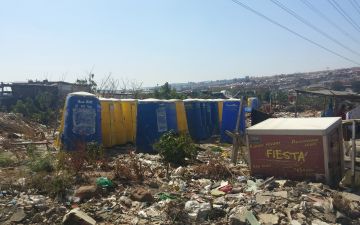Since the “dawn of democracy” in 1994, the South African government has struggled to overcome the effects of the apartheid era, as well as the new challenges that have arisen in its wake. Alexandra Township in the northeast of Johannesburg, is emblematic of the problems that persist in many of the country’s majority black communities: overburdened infrastructure, marked by burst pipes and piles of garbage; high rates of crime; and a vast housing shortage, added to by a flood of newcomers, that leads to the proliferation of shacks and other informal structures.
In 2001, then-president Thabo Mbeki announced the Alexandra Renewal Project (ARP), whose goal was to work toward urban development in the township. Over the next decade and a half, the ARP has managed to provide some houses for residents and improve some parts of Alexandra’s infrastructure. But plagued by quick administrative turnover and allegations of corruption in its early years, and, more recently, a legal dispute that put a temporary halt to development, Alexandra’s residents say that the ARP has failed to make as much progress as many of them had hoped for.
Christian Belanger takes a look at the township, and the effects of the ARP—how the project has helped people, where it has failed them, and the ways that Alex’s residents continue to live and work, sometimes on the edge of the law, 15 years after a big promise.




